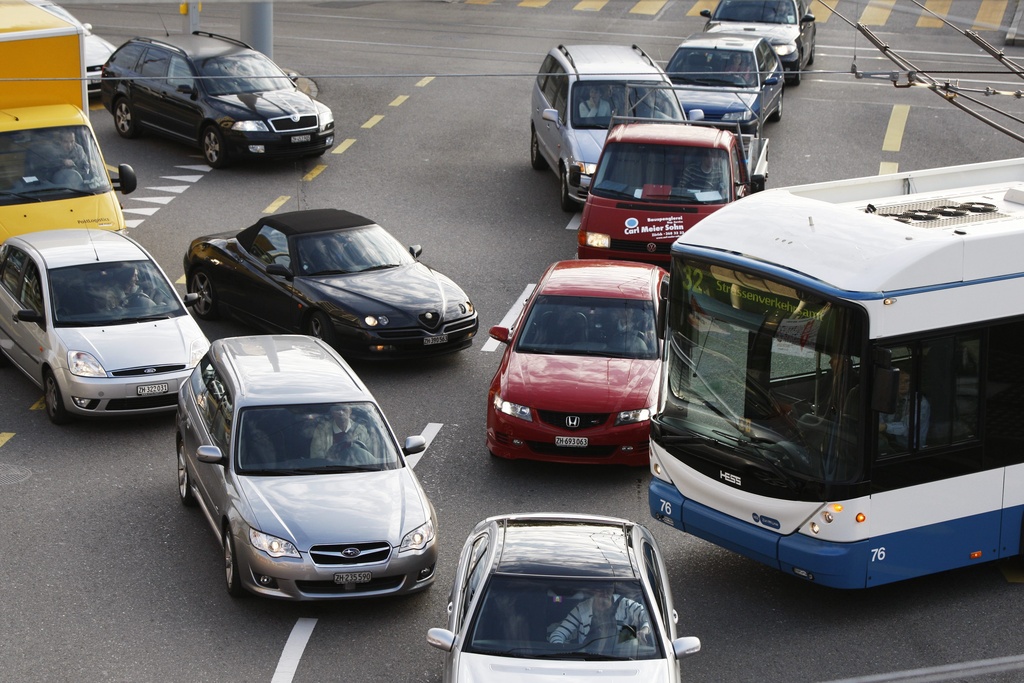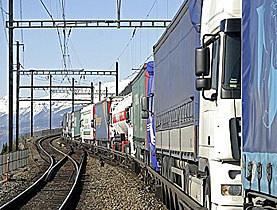Bumps in road could slow motorway plans

Fifty years after launching its ambitious motorway construction project, Switzerland boasts one of the densest – and possibly most expensive – networks in the world.
Even though there are only 100km left to build to complete the government master plan, few are satisfied. The motorist lobby wants wider roads while greens want to spend more on public transport.
Most visitors to the country often praise Switzerland’s excellent rail system, but the Swiss also possess an efficient road network.
The asphalt tentacles of the 1,790km of motorway reach into most nooks and crannies of the country. There is a motorway junction on average every four kilometres and most residents don’t have to drive more than 10 minutes to get on the nearest four-lane road.
But Swiss taxpayers pay a high price for such convenience: building a kilometre of road costs between SFr50 million and SFr257 million ($48 million and $245 million).
In comparison, the recently completed coast-to-coast motorway connecting the Irish capital, Dublin, with Galway carried a final price tag of €427 million ($550 million) – or just $2.84 million per kilometre for the entire 194km-long road.
A sampling of other major motorway building projects in the United States, Europe and India posted on the website, roadtraffic-technology.com, presents a similarly modest price tag with the most expensive average kilometre coming in at around SFr10 million.
Going round the mountain
Thomas Rohrbach of the Federal Roads Office told swissinfo.ch that it is not only the lay of the land (going around or through mountains) that sends costs skyrocketing. He says meeting strict environmental regulations, erecting noise barriers and digging culverts under the road for water drainage all drive up the price.
But despite the quality and density of the network, traffic jams are an everyday occurrence in Switzerland’s largest urban areas. And travellers during holiday periods often subject themselves to waiting hours in queues to get through the Gotthard tunnel on their way south to vacation in Italy.
According to Stephan Müller of the country’s main motorists’ organisation, Touring Club of Switzerland (TCS), the motorway network must not only be completed, but the roads around Zurich, Geneva and Lausanne should also be widened from four to six lanes.
This is a contentious solution to reducing road congestion, with environmentalists fiercely opposed.
“You cannot remove traffic jams. If you remove one, another appears elsewhere. All research shows clearly that you also increase demand,” explains Caroline Beglinger, responsible for politics at the moderate green organisation, Swiss Transport and Environment Association (ATE).
ATE supports the government plan to complete the 100km of missing motorway links but believes road-widening is not the answer to relieving congestion. The association is in favour of expanding the excellent, but often overcrowded, public transport system.
It wants 50 per cent of a car-fuel tax to be used to subsidise this move and has already collected more than enough signatures to bring the issue to a nationwide vote.
Highway robbery
Not surprisingly, TCS thinks this is akin to highway robbery.
“There is no reason to change the existing system. It would be unfair if car drivers had to contribute to the financing of the public transport network. We think the price of rail tickets should be raised,” Müller counters.
It boils down to the necessity of such an extensive, efficient road and rail network. For Müller, commuters have no choice but to drive since the trains are full to bursting at peak times.
For Beglinger, the Swiss use the fast roads just because they are there.
“If you want to travel 20km in half an hour, you do it. But [back in the day] when you once needed an hour to cover the same distance, you didn’t.”
Dale Bechtel, swissinfo.ch
The Swiss parliament voted in favour of building the country’s motorway network in 1960.
Nowadays, up to three times more cars and trucks use the national roads than were originally expected, and the original costs estimates (SFr12 billion) to build the network have skyrocketed (SFr70 billion, end of 2009).
The motorways see one-third of all kilometres driven in the country, even though they only account for two per cent of all roads in the country.
There are 1,790km of motorways. Planners expect the final 100km to be completed by 2020.

In compliance with the JTI standards
More: SWI swissinfo.ch certified by the Journalism Trust Initiative















You can find an overview of ongoing debates with our journalists here . Please join us!
If you want to start a conversation about a topic raised in this article or want to report factual errors, email us at english@swissinfo.ch.